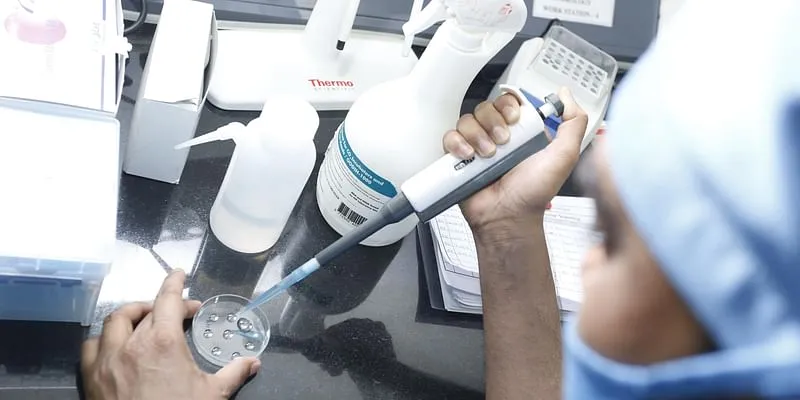How a small fertility clinic from Udaipur grew to become a Rs 850Cr turnover IVF centre chain in India
Indira IVF was founded by Dr Ajay Murdia in 2011 to provide personalised assisted reproductive technology (ART) treatment to aspiring parents. His journey began with a small infertility clinic in Udaipur. Today, the business rakes in Rs 850 crore turnover.
In 1988, fertility specialist Dr Ajay Murdia started a fertility clinic with Rs 5,000 in his pocket in Udaipur, Rajasthan, to provide personalised assisted reproductive technology (ART) treatment, as well as to make people understand that men, too, are responsible for infertility, and should get tested along with women.
Around the same time, he opened one of India’s first sperm banks in Udaipur and trained doctors from across the country. As medical sciences advanced and newer technologies were adapted, Ajay’s two sons — Dr Kshitiz Murdia and Nitiz Murdia — brought these services under the Indira IVF banner.
Dr Kshitiz Murdia, CEO of Indira IVF, tells SMBStory,
“When my father started a fertility clinic, he was not much welcomed by society. The issue of speaking about male infertility was a taboo. But things changed as he counselled and treated people, and, in turn, parents witnessed the positive results.”
At present, Indira IVF is among India’s leading IVF chains, clocking Rs 850 crore turnover.
Giving parents their precious moments
Growing from just two fertility clinics in 2015 (Udaipur and Pune) to 93 centres in 2020, Indira IVF has a presence across India.
Indira IVF uses various technologies like RI witness™ technology, closed working chambers technology, artificial intelligence (AI), and microfluidics, among others to help its patients.
With the RI witness™ technology from CooperSurgical, Indira IVF assures its clients of its extent of accountability. This electronic witness technology ensures sample safety, quality control, and efficiency, where every sample is labelled with an RFID chip.
“There is a recent Bollywood movie called “Good Newwz,” which shows a mix-up of eggs and sperms. With the use of RI witness™ — that is based on RFID — Indira IVF can say with certainty that such a mix-up is out of the question,” Dr Kshitiz said.
Even if there is a minuscule chance that there could be a possible mix-up in any of the centres, a notification is sent out to the central process monitoring unit in Udaipur, and the process is halted immediately.
The closed working chambers technology, on the other hand, is imported from Australia, and are work stations that provide a long-term stable environment (controlled CO2, temperature, humidity, and volatile organic compound-free atmosphere) for handling gametes, oocytes, embryos, and other tissues dependent on a controlled environment.
Explaining the speciality of this technology, Dr Kshitiz says,
“During an IVF process, the woman’s egg and the man’s sperm is taken outside for fertilisation. Due to the temperature variation, the gametes may receive a temperature shock that might affect their quality, subsequently affecting the embryos’ quality too.”

Indira IVF centre
He adds, “The use of closed working chambers ensures that the ideal conditions similar to the human body are consistently maintained, thus ensuring a better tendency to form good quality embryos, which result in improved pregnancy results.”
Indira IVF is one of the largest users of the RI witness™ technology from CooperSurgical in India. In fact, both the technologies are imported and implemented in all its 93 centres, making it one of the largest users and providers of these cutting-edge technologies in the country.
In 2017, Indira IVF established its training centres under the Indira Fertility Academy, where students from countries, including Liberia, Zambia, Ethiopia, Namibia, Malaysia, Philippines, Nepal, Bangladesh, Nigeria, Zimbabwe, and The Gambia study.
The academy is equipped with a one-of-a-kind stimulatory setup that mimics real-life surgeries and outcomes. It also trains the students on how to standardise the procedures across its clinics, further increasing the success rate of IVF.
Making a difference
According to Dr Kshitiz, in India, basis data from the IVF sector, nearly 2.5 lakh IVF cycles are performed annually.
While creating awareness among aspiring parents was one of the challenges Indira IVF faced, it overcame this challenge with the help of campaigns and awareness camps.
“Indira IVF focusses on four mantras – affordability, awareness, assurance, and accessibility. To make this a reality, we focused on eradicating the myths and stigma around infertility. The company has completed over 2,141 free consultation camps in over 742 cities, covering 24 states across India,” Dr Kshitiz says.
Moreover, Indira IVF has been working continuously to bring down the cost of IVF treatment with the best medical care for the larger masses. It competes with the likes of Nova IVF Fertility, Motherhood Fertility, and more.
It has made the fertility treatment affordable for various sections of society. With the large-scale implementation of advanced technology and SOPs, Indira IVF has managed the average treatment cycle cost to stay in between Rs 1.5 lakh and Rs 2 lakh.
However, it believes it has a long way to go. In fact, the current financing options such as EMI facility has its own limitations.
“By leveraging technology and standardising the procedures, we are constantly working towards improving the success rate in IVF procedures. Our IVF success rate is the highest in the industry, close to 72 percent,” Dr Kshitiz says.
He adds that he feels a concerted effort from the healthcare, pharma, and insurance industries can make IVF treatment much more affordable for aspiring parents.
Since its inception, Indira IVF has performed over 1,00,000 IVF cycles, of which, over 33,000 were performed last year alone – the highest to be performed in the country in a year.
Future prospects
The business strategy of Indira IVF is two-fold — first, improving accessibility through increasing its geographical footprint across the globe, and second, focussing on increasing clinical success rates and patient satisfaction, which are the real determinant factors for driving profitability in the IVF business.
Along with increasing reach across India and globally, the IVF centre actively plans on bringing new innovative technology to enhance patient satisfaction. Further, it is also taking a lot of measures for leveraging fixed costs to maintain growth and profitability.
“We have had a positive growth of over 20 percent in the past three years, and we are looking at maintaining the same growth trend. We have an asset-light model, and our Capex requirement is not heavy. We are a completely debt-free organisation, which gives us the flexibility to expand rapidly in the current scenario,” Dr Kshitiz says.
Indira IVF aims to add about 20-30 centres every year, with Southeast Asia and Africa as the next target market.
Edited by Suman Singh









